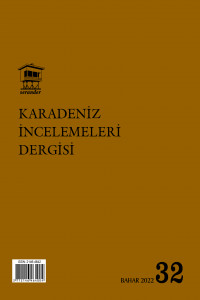Gürcü Akademisyenlerin “Türkiye’ye Karşı Meşru Taleplerimiz Üzerine" Başlıklı Mektubu ve Sonrasında Yaşanan Gelişmeler

Georgian historians claimed their ancestry traces back to the Hittites (Indo-European!) and Subarians, asserting a history spanning thousands of years.
 Gürcü Akademisyenlerin “Türkiye’ye Karşı Meşru Taleplerimiz Üzerine" Başlıklı Mektubu ve Sonrasında Yaşanan Gelişmeler (The Letter of Georgian Academics 'On Our Legitimate Claims Against Turkey' and Subsequent Developments)
Gürcü Akademisyenlerin “Türkiye’ye Karşı Meşru Taleplerimiz Üzerine" Başlıklı Mektubu ve Sonrasında Yaşanan Gelişmeler (The Letter of Georgian Academics 'On Our Legitimate Claims Against Turkey' and Subsequent Developments)
Author: Gürbüz Arslan
Year: 2022
Place of Publication: Türkiye (Online)
Published by: Karadeniz İncelemeleri Dergisi (Vol.16 No: 32)
Number of pages: 48 (pp.475 - 522)
Language: Turkish
Abstract
"The Soviet administration convinced neither the Turkish Government nor its allies regarding its territorial demands from Turkey and decided to continue its territorial claims through the republics affiliated with it. Accordingly, it was thought that the international public would not criticise the Union of Soviet Socialist Republics (USSR) for holding an expansionist policy against Turkey, and its territorial demands would be considered reasonable. In line with the decision taken by the Soviet administration, the Georgian Soviet Socialist Republic also became involved in this process, and soon afterwards, the Georgian academics‟ letter titled “On Our Legitimate Claims Against Turkey” was published in Georgian and Soviet press. Following the letter‟s publication, the world became aware of the USSR‟s territorial demands from Turkey, thanks to Georgian academics. This study aims to contribute to the literature by revealing the process that led to the publication of the letter titled “On Our Legitimate Claims Against Turkey” by Georgian academicians. The study examines the publication process, the letter‟s content and the subsequent events after publication in the light of relevant studies, archival documents, and domestic and foreign periodicals."
The full article in PDF can be downloaded by clicking here (2.5 MB)
Published on December 14, 1945, by the Communist newspaper in Tbilisi, the letter “On Our Legitimate Demands Against Turkey” by Georgian academics Simon Janasia and Nikoloz Berdzenishvili gained further exposure when republished in major Soviet newspapers such as Pravda, Izvestiya, and Krasnaya Zvezda on December 20. This publication ensured that the USSR's territorial demands on Turkey, articulated through the voices of Georgian academics, were recognized worldwide.
In their letter, Georgian scholars trace their nation's history back to 2000 BCE, attributing their ancestry to the Hittites (Hittite is the oldest Indo-European language known —Ed.) and Subarians, who they claim ruled over the territories they now seek from Turkey. They argue these lands are integral to Georgian identity. Janasiya and Berdzenishvili assert that Georgians have historically occupied a vast region from the Taurus Mountains to the Caucasus, engaging in agriculture, state-building, and defence of their lands. They emphasise the ancient roots of the Georgians in these territories, citing the establishment of significant cultural centres by their ancestors.
The letter then focuses on the Georgian people's enduring struggle over three millennia to maintain their identity and reclaim their ancestral lands. This narrative includes conflicts with various conquerors, including the Romans, and highlights the resilience and determination of the Georgian people to preserve their heritage and rights.
In his text titled "The Myths of the Georgians," (Gürcülerin efsanesi: Jeopolitik ilmi antoloji denemesi. , 42-46. ss 1946 - İstanbul) Fuat Köprülü critiques the claims made by Georgian academics in their letters about Georgian history. He suggests that their descriptions resemble legends and fairy tales more than a scientific understanding of history. Despite not having information about the academics' scientific credibility, Köprülü doubts they would confuse history with legend to such an extent. He concludes that these academics, driven by political motives, deliberately distorted historical truths and attempted to deceive global opinion. Köprülü emphasizes that such fabrications are incompatible with the dignity of science, which prioritizes the pursuit of truth above all. Köprülü then refutes the claims made in the letter about Georgian history. He notes that no reputable historian starts Georgian history with the Hittites, arguing that attributing Hittite civilization to Georgians and extending Georgian history back to 3000 BCE lacks scientific validity. He also disputes the classification of Laz people as Georgians based solely on linguistic similarities with the Mingrelian language, pointing out that Georgian historian Professor Marr recognizes Laz as a distinct, independent language. While he acknowledges the expression of a vibrant Georgian civilization between the 11th and 13th centuries as a natural pride in their national culture, he stresses the importance of adhering to historical facts, noting the civilization's lack of clear originality and its blending with local elements. Lastly, Köprülü addresses the claim that Georgians, having been severely weakened by Jalal ad-Din Mingburnu shortly before the Mongol invasion, protected the Western world against the Mongols as inconsistent with historical facts.